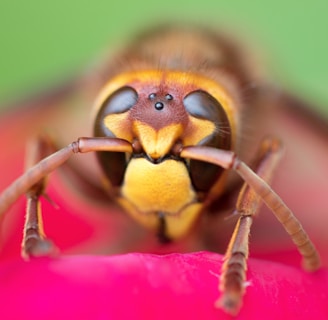Wasps and Hornets: Unsung Heroes or Annoying, Stinging Enemies?
We all know honeybees are cool and give us honey, but are their wasp and hornet "cousins" garden heroes or nuisances that must be terminated?
FAMILY LIFEDIY
Porkchop
7/15/20245 min read


The Unexpected Benefits of Wasps and Hornets
When we think of wasps and hornets, it's usually not with a fond smile or a sense of gratitude. My first thought honestly is something like, “Get close to me and I’ll murder your whole nest!”. However, these often misunderstood insects actually serve as nature's unsung heroes, playing critical roles in maintaining a balanced ecosystem. Despite their bad reputation and lack of honey production, wasps and hornets maybe are more than just stinging assholes; they are, in fact, the unexpected gardeners and bodyguards of our natural world.
One of the most significant benefits these insects offer is pest control, yes, they get rid of possibly “cuntier” pests. Wasps and hornets are voracious predators, feasting on a variety of insects that would otherwise wreak havoc on our crops and gardens. A garden without these bodyguards would be overrun by caterpillars, aphids, and other pests in no time. By keeping these populations in check, wasps and hornets help ensure that our plants can grow healthy and strong, making them invaluable allies in agriculture and gardening.
Though not as celebrated as bees, you know since honey is fucking awesome, wasps and hornets also contribute to pollination. While their pollination efforts may not be as prolific (see, bees are still cooler), they still play a part in the reproduction of various plants. Their inadvertent role as pollinators helps ensure biodiversity, supporting a range of plant species that might otherwise struggle to reproduce.
Beyond their environmental contributions, the venom of some wasp species is being researched for potential medical applications. Scientists are exploring its use in treating cancer, as certain compounds in wasp venom have shown promise in targeting and destroying cancer cells. This emerging field of study could lead to groundbreaking treatments, turning these often-feared insects into unlikely medical pioneers. And if this is true, I guess we can finally welcome these pests like we do honeybees.
So, the next time you encounter a wasp or hornet, remember that these misunderstood bodyguards are hard at work, protecting your garden and contributing to scientific advancements. They may not produce honey, but their contributions to our ecosystem and potential in medicine make them worthy of our respect and appreciation. Still… if there are hornets and wasps flying around my kids and pets, I will kill them before they sting anyone!


Keeping Your Home Wasp and Hornet-Free
While wasps and hornets play a crucial role in our ecosystem, their presence in and around our homes can be a real pain in the gooch. To ensure that these insects do not become unwelcome pains in the ass, it is essential to adopt a series of preventative measures. By following these best practices, you can significantly reduce the likelihood of wasps and hornets nesting on your property.
First, sealing potential entry points is imperative. Inspect your home for cracks, gaps, or holes in walls, vents, and window frames. Use caulk or weather stripping to seal these openings, effectively barring wasps and hornets from accessing the interior of your home. Even the smallest crevices can serve as entry points, so thoroughness is key. Keep these annoying, flying twats out!
Maintaining a clean environment around your home can also deter wasps and hornets. Ensure that garbage bins are tightly sealed and regularly cleaned to avoid attracting these insects. Additionally, promptly remove any food or drink residues from outdoor areas, as these can be irresistible to wasps. By minimizing attractants, you significantly reduce the chances of an invasion. Be clean you filthy animals!
Removing potential nesting sites is another critical step; if they can’t become squatters on your property they will NOT overstay their welcome! Regularly inspect your property for early signs of nests, particularly in sheltered areas such as eaves, attics, and sheds. If you discover a nest in its infancy, it is far easier to kill it at this stage than to deal with a full-blown colony of flying, stinging cunts. Use a long pole or a spray specifically designed for wasp and hornet removal, taking care to follow safety instructions.
For those preferring natural repellents, essential oils can be remarkably effective, I generally prefer the chemical stuff that gets the job actually done. Peppermint oil, for example, is known to repel wasps and hornets. Mixing a few drops of essential oil with water and spraying it around potential nesting sites can serve as a deterrent. Additionally, planting certain types of flora such as eucalyptus, mint, and citronella can naturally discourage these insects from settling in your garden. OR you can just go ahead and get something that actually works without woo woo nonsense or crystals.
Finally, while it may sound exaggerated, imagining a full-scale wasp invasion can underscore the importance of these preventative measures. Picture wasps taking over your backyard barbecue or hornets setting up shop in your attic. Seriously, picture these cunts ruining every time you want to enjoy your yard with your family and friends. Such scenarios, though unlikely, highlight why proactive steps are so crucial. By following these best practices, you can enjoy a wasp and hornet-free home, maintaining peace of mind and a safer living environment.


Effective Methods to Remove Wasps and Hornets
When wasps and hornets decide to make your home their own, it can be both alarming and challenging. At this point you must fight to win the war! There are several humane and effective methods to remove these insects without causing harm to them or yourself (but seriously, kill THEM and see YOURSELF from harm). One popular DIY solution is the homemade trap. These traps can be made using simple household items like a plastic bottle, some sugar water, and a bit of dish soap. The sweet scent lures the wasps into the bottle, where they become trapped and eventually perish.
Natural repellents are another option for those who prefer to keep wasps and hornets at bay without harming them, just know the rest of us men are judging you. Essential oils such as peppermint, eucalyptus, and citronella can be mixed with water and sprayed around areas where these insects are likely to build nests. The strong scent of these oils is known to deter wasps and hornets effectively. If all this nonsense fails, put down the crystals, and buy some good treatments from your preferred big box store.
However, before you embark on any DIY method, it's crucial to consider safety. Protective gear, including gloves, long sleeves, and face masks, should be worn to minimize the risk of stings. Wasps and hornets can become aggressive when their nests are disturbed, so taking precautions is essential so the annoying , stinging twats don’t take YOU down. Again, it is a war and you must NOT give up any concessions to your enemy.
While DIY methods can be effective, there are times when professional pest control services are the best option. Larger infestations or nests that are difficult to reach, such as those in attics or high up in trees, require the expertise of professionals. They have the necessary tools and knowledge to safely remove nests without putting anyone at risk. Seriously, don’t get destroyed by these flying terrorists, get a professional if it’s truly that bad.
But let's not forget the humorous side of DIY pest control. Imagine attempting to construct a homemade trap, only to find yourself in a slapstick comedy scene, covered in sugar water and being chased by an irate swarm. That would suck major balls and probably would ruin your day (if not much worst). These hypothetical situations underscore the importance of knowing when to call in the experts. After all, while DIY can be fun, it’s best to leave the more challenging tasks to those with the right skills and equipment. Win the war, kill the stinging pests!
